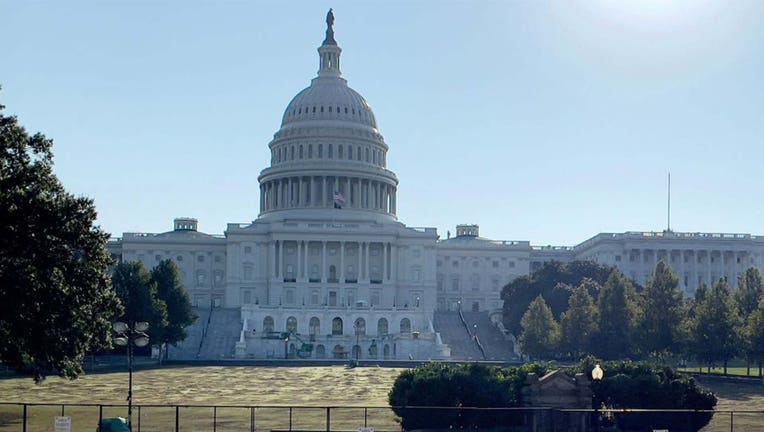Florida Senate passes congressional redistricting plan pitched by Gov. DeSantis

FILE - The US Capitol seen on Sept. 19, 2021 with fencing and closed areas to the public.
TALLAHASSEE, Fla. - Over the objections of Democrats who contend Republicans are being "bullied" by Gov. Ron DeSantis, the Senate on Wednesday approved a congressional redistricting plan that would favor the GOP.
The 24-15 party-line vote set the stage for final passage Thursday in the House. The most-controversial parts of the plan (SB 2-C), which DeSantis proposed, would diminish the chances of electing Black Democrats in districts in North and Central Florida.
Senate Reapportionment Chairman Ray Rodrigues, R-Estero, defended a decision by legislative leaders to take up the governor’s proposal, rather than allow an impasse that could result in new lines being drawn by a court. DeSantis called a special legislative session that started Tuesday.
"I've heard a number of objections that have said the Legislature is abdicating its responsibility by allowing the governor to have this role in redistricting," Rodrigues said. "I disagree with that. We would abdicate our responsibility if we failed to pass a map and allow the courts to do it."
Rodrigues maintained the map is a "compromise," with the governor’s plan incorporating Senate proposals for districts in South Florida.
Overall, the governor’s plan is expected to increase the number of Republican-held congressional seats in the state from 16 to 20, based on 2020 voting patterns. It is almost certain to quickly face legal challenges, which likely won’t be resolved until after the 2022 elections.
Questioning a "racial" intent of the governor’s map, Democrats said it would violate the federal Voting Rights Act and what are known as the Fair Districts amendments in the Florida Constitution. Voters approved the Fair Districts amendments in 2010, at least in part to try to prevent gerrymandering.

"Looking at this map, one cannot even say that it works to respect geographical boundaries," Sen. Janet Cruz, D-Tampa, said. "Sections of the Pinellas (County) portion of the map appear to cut neighborhoods in half. And, in one instance, even appears to cut a building in half."
Sen. Randolph Bracy, an Ocoee Democrat who has made plans to run for Congress this year, warned that "bullying" by DeSantis that resulted in the special session "will get worse."
"He will continue to threaten to primary endorsed candidates from the leadership of this (Senate) chamber," Bracy said. "If you think that he's going to endorse anybody's candidacy because we're doing his bidding, it's not going to happen. It's going to be something else. ‘OK, let's see how you do in the next special session? Oh, well, let me just wait and see ‘til qualifying in June.’ That's how they work. And you're going to continue to play this game with him."
When Senate President Wilton Simpson, R-Trilby, advised Bracy to "stay on the content of the bill and not the governor," Bracy replied, "I think I made my point."
DeSantis called the special session after vetoing a congressional redistricting plan passed by the Legislature last month.
DeSantis contended the Legislature’s plan violated the Equal Protection Clause of the U.S. Constitution, in part because of a sprawling North Florida district. DeSantis’s plan would redraw District 5, which now runs from Jacksonville to west of Tallahassee, to become a more-compact district in the Jacksonville area. The seat is currently held by U.S. Rep. Al Lawson, a Black Democrat.
Upcoming legal battles are anticipated to include debate about the Fair Districts amendments and how the U.S. Supreme Court has interpreted the Voting Rights Act.
The current configuration of District 5 emerged after a court fight about lines drawn in 2012. Rodrigues said the governor’s office determined that District 5 cannot be drawn as a majority-minority district with a Black voting-age population of greater than 50 percent in any configuration.
"It was also their position that it never should have been drawn that way in the first place by the previous court," Rodrigues said. "And so, therefore, there's no obligation to redraw it in the current manner that it exists."
Sen. Loranne Ausley, D-Tallahassee, said the governor’s effort is intended to limit minority access in North Florida in the guise of "compactness."
"While this body has not provided us with partisan performance data, the publicly available data shows that in the current version of the 5th District, this cohesive community of Black urban and rural voters makes up a Democratic primary that is 70 percent Black," Ausley said. "In fact, all of the counties in this district but one are majority Black in the Democratic primary, allowing the historic African-American community of North Florida to elect the candidate of their choice."
DeSantis’ plan also would make significant changes in Central Florida’s District 10, which has been held by U.S. Rep. Val Demings, a Black Democrat who is running for U.S. Senate.
Rodrigues said the governor’s office backed a House position that the Central Florida district was no longer a protected minority-opportunity district because the Black voting share of Democratic primary turnout had fallen below 50 percent during the past decade.
Sen. Kelli Stargel, R-Lakeland, called the governor’s proposed lines "constitutional" and "thoughtful."
"I don't think any of us who vote for them today are racists or following the direct will of the governor," Stargel said. "We're doing our constitutional requirement of drawing maps, submitting maps, discussing maps, working together with our branches of government and making sure we have a constitutional map."
The Republican-dominated House took up DeSantis’ plan Wednesday and rejected two amendments proposed by Democrats. As an example, Minority Leader Evan Jenne, D-Dania Beach, proposed using lines the Senate initially put together during the regular legislative session.
"This amendment complies with the Florida (Constitution) and the federal Constitution," Rep. Joe Geller, D-Aventura, said. "This amendment does not fly in the face of them."
— Executive Editor Jim Saunders contributed to this story.

